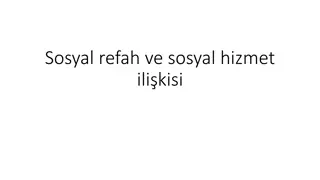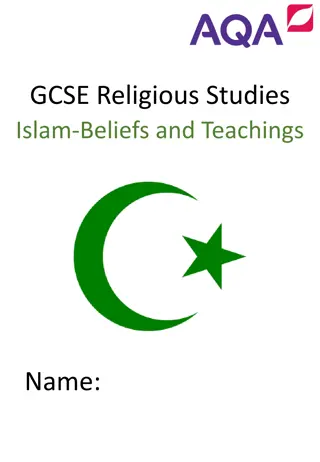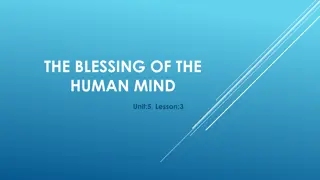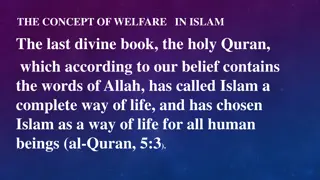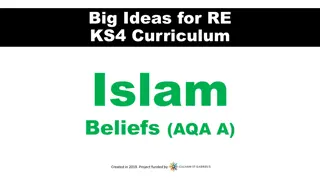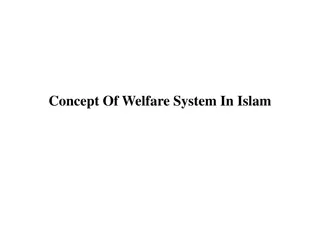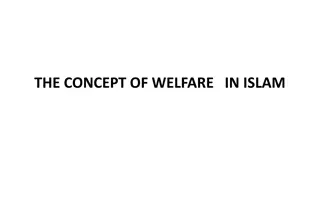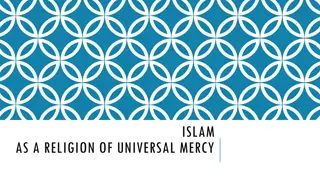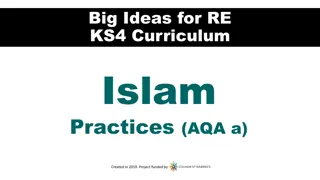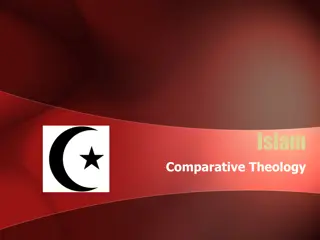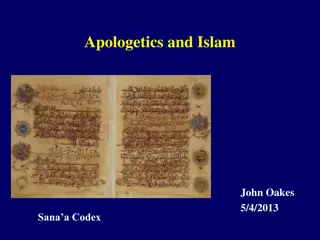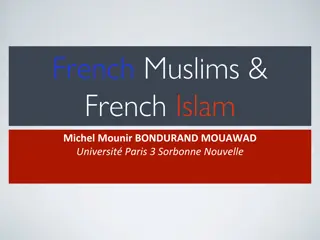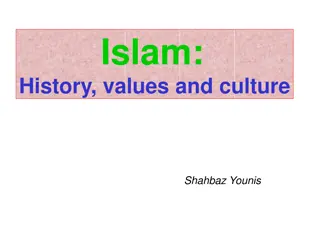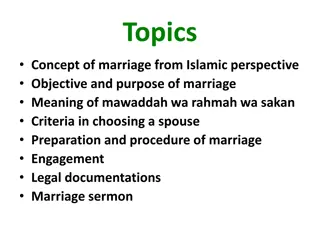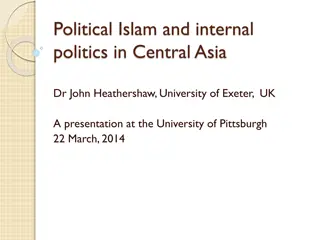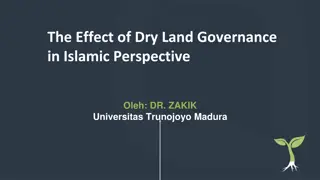The Concept of Welfare in Islam: A Comprehensive Perspective
The concept of welfare in Islam is deeply rooted in the teachings of the Holy Quran, emphasizing Islam as a complete way of life. The integration of temporal and spiritual authorities by Prophet Muhammad and his caliphs laid the foundation for the first welfare state in history. Islam recognizes no distinction between sacred and secular, viewing all aspects of human life as interdependent and interconnected. This holistic approach underscores the goal-oriented nature of Islam as a societal framework guided by its own principles.
Download Presentation

Please find below an Image/Link to download the presentation.
The content on the website is provided AS IS for your information and personal use only. It may not be sold, licensed, or shared on other websites without obtaining consent from the author.If you encounter any issues during the download, it is possible that the publisher has removed the file from their server.
You are allowed to download the files provided on this website for personal or commercial use, subject to the condition that they are used lawfully. All files are the property of their respective owners.
The content on the website is provided AS IS for your information and personal use only. It may not be sold, licensed, or shared on other websites without obtaining consent from the author.
E N D
Presentation Transcript
THE CONCEPT OF WELFARE IN ISLAM The last divine book, the Holy Quran, which according to our belief contains the words of Allah, has called Islam a complete way of life, and has chosen Islam as a way of life for all human beings (Al-Quran, 5:3).
The meaning of Islam Islam is Arabic word which means submission and obedience to Allah. When Islam is termed as complete way of life, it means it.: no aspect of life social , political, economic or personal, is out of the sphere of Islam.
The Holy prophet Muhammad (PBUH) and his four caliphs (Khulafa-e-Rashedeen) made it an authority for the rest of time and world. They actually united the temporal and spiritual authorities and practiced them in a human society and which in the first instance remained in practice for a century in one go. (till the period of Omar bin Abdul Aziz 717-820 AD or 99-101 AH).
During this period , even though the caliphate was converted into dynastic kingship (Mulukiat), the basic structure of the Islamic state welfare services remained unaffected despite the fact that the public exchequer was in the hands of the kings or the so-called caliphs. It was the Islamic state and Government which laid the foundations of the first welfare State in the human history on this planet, well documented in history but not documented in the history of the welfare state.
The sacred and the secular Today, things and actions are divided into sacred and the secular and are two different things. One is private and the other is social. Islam does not differentiate between the two. Every secular thing if is in the service of human welfare is sacred. Islam recognize this world as a source of salvation and prosperity in the eternal life in the world hereafter. As a Muslim we believe in the fundamental that there is life after death and every one will be accountable for his/ her deeds and/or misdeeds.
Islam views life as a consistent whole and all the aspects of the human life whether economic, social or political, are considered as interdependent. ;there is no room for any aspect of life to be separated in secular and sacred. Every socio-economic and political system is goal oriented and inconceivable with out any organized community / society governed in accordance with the tenets of that system. Similarly Islam as a way of life is goal oriented and needs an organized society for its governance in accordance with its own tenets
The Islamic Approach to Social Welfare Catering to the welfare of the people and relieving them of hardships is a basic objective of the Islamic State, and the Islamic concept of welfare encompasses all the welfare services which are known in the west as social services - education, health, rural development, agriculture, public health, sanitation, income maintenance, child welfare, law and order and any other aspect of material and social well- being.
The Islamic welfare model is much broader in the sense that it considers man not only in need of material needs but also in spiritual needs and Islam does take notice of that as well. Man is made up of matter (clay)[1] and Islam wants his material well-being. But that matter is also infused with a soul and matter and soul comprise an indivisible human being. Man s material and spiritual needs are therefore, necessary and indivisible. [1] Al-Quran, (Al-Hajr) 15: 26.
God almighty has created sources for meeting the material needs on and above the earth and made them subject to the humans[1]. All these resources on, and above or below the earth are for human beings and not for any particular privileged group/ class or country; and it can therefore, also be inferred that they are meant for general welfare the eradication of poverty and fulfilling the basic material needs of all humans. [1] Al-Quran, Al-Baqara: 2.29. see also Al-Quran, Al-Luqman, 31;20, Al- Ibrahim 14:32.
ISLAMIC PHILOSOPHY OF WELFARE The basic philosophy of Islamic welfare system is that the Islamic state is not only to provide charity and basic needs to the citizens but a system, which removes all hindrances in the development of personality. Hence, in an Islamic state the ultimate aim is to attain Saadah blessings of Allah, the Great, -a man s best self and the attainment of perfection.
A-Ghazali and Islamic Welfare Al-Ghazali has defined the objectives of the Islamic politico-Legal system as the promotion of public welfare, and according to him public welfare refers to safeguarding faith, intellect, life, property and prosperity[1]. [1] Abdul Hamid Al-Ghazali, Al-Musatafa Vol.-I.. Al-Maktaba Al-Tajiran Kurba, Cairo,pp.130-40
Al-Qayyem and welfare Ibn-Al-Qayyem emphasizes that the basis of Islamic Sharia is wisdom and welfare of the people in this world as well as in the world hereafter. He enumerates the elements of public welfare as complete justice, mercy, welfare and wisdom[1]. Hence in contrast to the welfare system of western democracies, the Islamic welfare state takes care of the spiritual as well as material welfare. [1] Ibn-AlQayyem Al_jawzzia, Ilam-ul-Muaqi in Khurshed Ahmad (ed), 1990. Studies in Islamic Economics. Islamic Foundation UK. P.149
Hence, in an Islamic Sate all the organizations and institutions should reflect the characteristic of merciful blessings and cater for the welfare of all people. Alongside material prosperity the Quranic commands emphasize the spiritual aspect of humanity, for Islam helps a man both in this world and in the world hereafter .

 undefined
undefined


